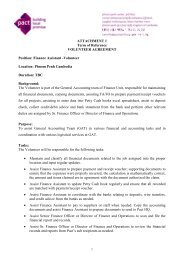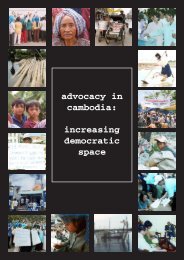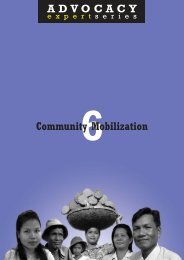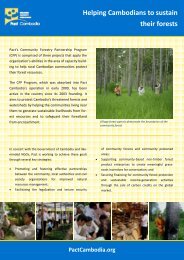Advocacy - Module 4 - English.pdf - Pact Cambodia
Advocacy - Module 4 - English.pdf - Pact Cambodia
Advocacy - Module 4 - English.pdf - Pact Cambodia
You also want an ePaper? Increase the reach of your titles
YUMPU automatically turns print PDFs into web optimized ePapers that Google loves.
Introduction<br />
A coalition is a group of people or organizations working together to pursue a single goal. In<br />
coalitions, all members make a long-term commitment to share responsibilities and resources.<br />
Whenever possible, our organization should seek to build or join a coalition to strengthen the<br />
impact of our advocacy. The purpose of this book, the fourth in our <strong>Advocacy</strong> Expert Series,<br />
is to explore methods of creating and sustaining coalitions that will assist us in advancing the<br />
goals of our advocacy campaign.<br />
Why should our NGO form a Coalition?<br />
Coalitions allow us to share information, ideas, and resources with other<br />
organizations as well as distribute the risks and responsibilities of our<br />
advocacy campaign among members. In addition, coalitions offer us:<br />
• Safety<br />
• Increased access to decision makers and other contacts<br />
• Improved credibility and visibility<br />
• An opportunity to broaden public support<br />
• A chance to strengthen civil society<br />
What is a Coalition?<br />
Coalitions are groups of people or organizations<br />
working together to pursue a single<br />
goal. In coalitions, all members make a longterm<br />
commitment to share responsibilities<br />
and resources.<br />
What is an Alliance?<br />
Alliances are based on short-term relationships<br />
between people or organizations to<br />
achieve narrowly focused objectives. Limits<br />
on time and responsibilities make alliances<br />
less demanding than coalitions on their<br />
members.<br />
What is a Network?<br />
Networks are people or organizations with<br />
Different NGOs have different areas expertise, different resources, and similar interests or concerns who share information<br />
and ideas. Each person or organiza-<br />
attract different stakeholders. Building a diverse coalition with a variety<br />
tion remains independent.<br />
of NGOs will increase our chances for success and prove to decision<br />
makers that there is broad social support for our desired policy change. Decision makers are also more likely to pay<br />
attention to coalitions–a coalition of several NGOs working together can advocate more effectively than one.<br />
Creating a Successful Coalition<br />
Successful coalitions are built on trust, respect, and a commitment to working together. In order for a coalition to remain<br />
strong, participating organizations must respect each other and the decisions made by the coalition leadership. All successful<br />
coalitions share:<br />
1<br />
Diverse<br />
2 3<br />
Clear coalition membership<br />
structure and broad<br />
outreach<br />
4 5<br />
leadership<br />
Skilled and<br />
diverse<br />
Reliable<br />
system of<br />
communication<br />
and conflict<br />
resolution<br />
Trusting<br />
relationships<br />
among<br />
members<br />
There are two ways of getting involved in a<br />
coalition: Join one or build one ourselves.<br />
Before building a new coalition to advance<br />
our advocacy campaign, check to see if one<br />
already exists.<br />
2<br />
Building and Maintaining Coalitions
















